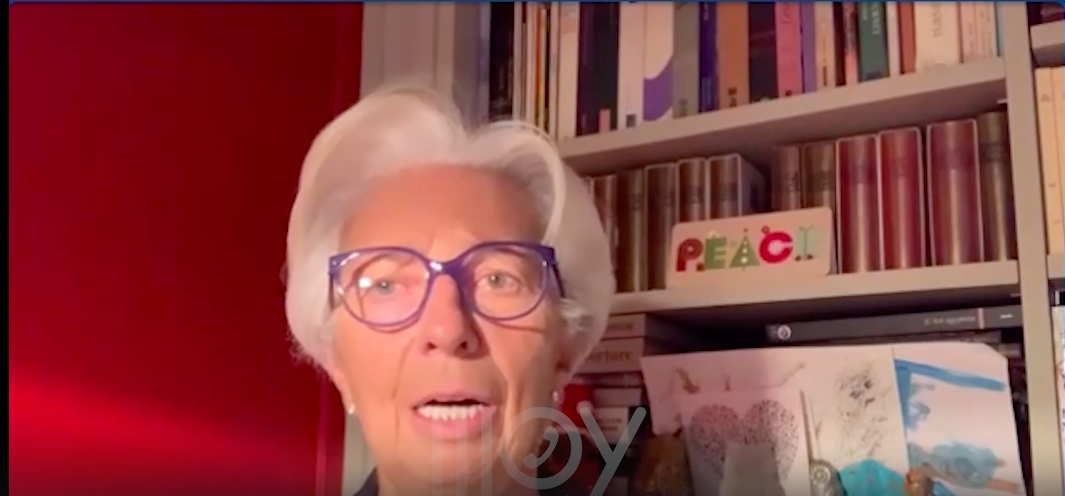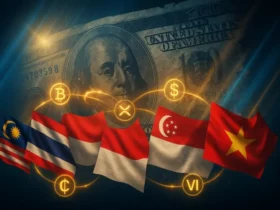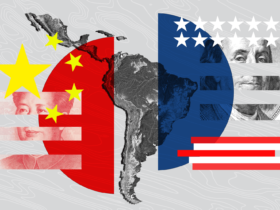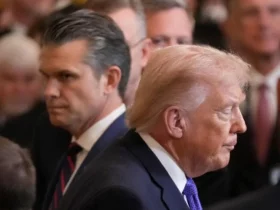Russian pranksters Vladimir Stolyarov (Vovan) and Alexei Kuznetsov (Lexus) held a conversation with the head of he European Central Bank Christine Lagarde on behalf of the Ukrainian President Vladimir Zelensky. The recording of the prank was published on Wednesday, March 15.
During the conversation, Lagarde told the pranksters who called on behalf of Zelensky about the crisis in Europe and the negative role of Türkiye on sanctions against Russia.
We present to our readers full transcription of this conversation.
Prankster: Hello, can you hear me?
Lagarde: Yes. Can you hear me?
Prankster: I can hear you very well, OK, Madam President, I’m glad to see you, glad to hear. I’m concerned about the economic situation in Europe. It’s, you know, that is assistance to Ukraine depends on it. And some countries are already openly saying that internal problems are more important to them than Ukraine. So I just would like to ask you how the things in Europe as a whole, how did the crisis hit? So what is your position?
Lagarde: Well. We have an issue is on inflation because of the bottlenecks that have survived the end of COVID. We are seeing prices that have initially gone up only in the area of energy.
And then gradually through fertilizers in particular to food and now on a much broader basis.
So the inflation that we had hoped would be transitory has continued much longer than thought and at a much higher level than expected. So as a result of that, all central banks, and the ECB is no exception, have to take measures in order to reduce inflation so that people do not suffer from high prices and we have a more stable economy. As a result, we have started raising interest rates, which as you know were minus 50 basis points about a year ago, and which are now at 2% for the most frequently used interest rates. So we have growth that is low, we have prices that are too high that we have to bring down. That’s the situation that we have at the moment.
Sanctions are “not biting as much as we have expected”
Prankster: Why do you think how Russia was able to overcome, overcome the sanctions? I’m told the sanctions are heating the European economy and the euro, I think more than we expected. And so are the sanctions working? Or is Europe shooting itself in the foot? Russia’s GDP has grown now as the 9th in the world. How do you assess the policy of Central Bank of Russia and head of Russia’s Central Bank, Elvira Nabiullina. They managed to save the rubble. Why do you think so?
Lagarde: I think Elvira, whom I know well, is a very good central bank governor. She very quickly understood what the situation was and she increased interest rates massively and that was at the time the right response in order to make sure that inflation was not going to go through the roof and in order to make sure that people who had invested in Russia, essentially Russians, would keep the money in Russia. So she managed that very well in the early days and as a result of that inflation went up, but not very much, and went back down again. So she did a magnificent job.
I have no, you know, no hesitation to say that. I do think that the sanctions are biting not as much as we had expected. That is true. And I also think that the technological barriers that are that are now imposed on Russia will also have an effect on their growth and on their business model. The problem with the energy prices as I see it, and I’m not an energy expert, is that they still manage to sell a lot of their energy, whether it is oil or whether it is gas to other countries than those countries that apply the sanctions. And certainly outside of the European Union, when they sell to India, when they sell to China, when they sell to the Far East, well, they managed to get currencies in and I don’t know whether they get renminbi, whether they get rupees or what, but they certainly managed to sell and to bring money in.
Prankster: I mean, how do you think the position of the EU about the cap for oil price for Russian oil? So will it help really?
Russians “very good at circumventing”
Lagarde: Are you are you talking about the $60.00 cap?
Prankster: Yeah.
Lagarde: Well, yes, I think it will help if it is properly implemented and enforced.
Now it I think that all the big insurance companies, all the brokers, all the shipping companies that are operating out of Europe, out of the United Kingdom, out of the United States will respect the cap and will not provide insurance and will not provide shipping if prices are set higher than that. But you and I know that the Russians are very good at circumventing. And, you know, moving around the sanctions and the fact that they have accumulated vessels, you know, oil tankers, and that they are trying to set up some insurance, domestic insurance mechanism is a way for them to try to circumvent the sanctions that we have imposed.
Threats to G20 leaders
Prankster: I think that another problem is, is that they have such a partner as Türkiye. So they helped them really much and it’s, it does not give us good success. So I think how we could make our sanction policy better?
Lagarde: But any it is, it’s something that political leaders have to think through. But any pressure that the US, the UK, the European Union, the Australians, Canada of course, can put on all the other players will matter. Because in in a system if you have exit doors or back doors through which you can escape the main sanctions of course it weakens the system. So I don’t know whether through NATO, Turkey can be put under pressure, but that’s one avenue. Türkiye is playing a funny game because you know by blocking or announcing that they will block Sweden and Finland, of course, they put themselves in that good bargaining position and it’s difficult to put very much pressure on them when you ask them to vote for Sweden and Finland. But it’s all the countries of goodwill, the coalition of the willing to support Ukraine that have to really put other countries under pressure. There will be, you know, there will be a G20 in India coming up soon for the finance ministers and the central bank governors, and I think it would be a good occasion to remind all the other G20 leaders of their duty for peace and their duty for stability. Because if they don’t respect those rules, then stability is an issue.
Prankster: I think that it’s not good game for Türkiye especially. And by the way, I just want to ask you what is how, how is your opinion? Who has a worse situation among the EU countries now? Who had suffered more?
Lagarde: Yeah, if, if I look at, if I look at my inflation numbers, which is the barometer that I use. The countries that are closest to Russia, surprise, surprise, like the Baltic countries, are taking a huge big hit because they were trading partners, because there is a political risk that is associated with them. So there are the ones that have the worst numbers. If you look at, you know, debt to GDP, a country like Greece is at risk, but it’s not a big risk because a lot of the borrowing is with a quasi-official institutions like the European Stability Mechanism. The other country that has a high debt to GDP is Italy, of course.
Situation in Europe “going unstable”
Prankster: So I’m also worried so you it’s a half of our loans is the US loans and 50% of this is from eurozone. So it’s also impact on currency rates. And my question is, what is the maximum inflation you see in Europe this year?
Lagarde: You know everything has been a surprise in terms of economic projections, in terms of inflation. So it’s hard for me to say but the official projections that we have put inflation at around 7% for 2023 and I will have to double check the numbers because I think I’m giving you a number which is a bit on the low side it’s probably a little higher than that.
And this time I think it’s pretty hard to have a right forecasts, you know, that situation is going unstable.
Prankster: So, so do you think it is possible to increase the rates to four percent for ECB?
But that that, you know, I wish I could tell you, I wish I had a crystal ball to say that, but I cannot say so for, you know, at this point in time it’s going to be a factor of impact of our action on level of inflation, scope, you know, does it apply only to energy? Is it food? Is IT services? We have multiple ways to measure inflation. What I know is that it will interest rates will continue to rise inevitably. But up to what point? What will be the terminal rate? When will we reach the terminal rate? That I cannot tell you. I don’t know. My economists said that in negative forecast interest rates in ECB could reach 4 persons. As I told you I do not have currently a terminal rate nor a time when we reach terminal rate. The only thing I can tell you and the economist who are advising you, and I’m sure that they are as competent and as honest as my economist, is that it needs to go higher than where we are at the moment, because otherwise we will not manage to tame inflation.
Prankster: And the question is how do you think, what do your colleagues from feet think about that? Do you have a conversation with them?
Lagarde: We do of course have conversations. We exchange a lot. And actually I will be seeing Jay Powell (Chair of US Federal Reserve, UWI) tonight. We have dinner tonight.
We have a meeting of the Bank of International Settlement in Basel and I’m having dinner with him tonight. So yes, we do talk a lot. But you know, President, whatever is the coming out of this situation, who wins? Who loses? In a way this is irrelevant. What matters is that Ukraine, at the end of the day, wins. So I take the very the very simple view that those who have the biggest gun at the end of the day win, right? This is a very stupid, basic Wild West cowboy principle. It is the case at the moment that the biggest military power in the world is the United States. So the United States is supplying the biggest shipment of weapons, is providing a very large amount of funding. And that’s the reality that we deal with and I don’t think that we can just argue about who wins, who loses. It’s you who has to win, and we have to make every effort we can to support you.
Future of electronic money in Europe
Prankster: OK, let’s stop to talk about set things. I’m really glad to see you. And I’m glad to see a smart, smart woman at this position. And I think that you’re pretty nice. Well, I have a question about I’m also a good user of electronic money. So my question you’re introducing the electronic euro. How can switching to electronic currency help?
Lagarde: Well, two things. Number one, it will be decided in October. So we are preparing the ground. We want to be ready, we want to be trained, but it will not be decided until October 23. The reason I’m personally convinced that we have to move ahead is a situation like the one we are in now. We are dependent on the supply of gas by a very unfriendly country. I don’t want Europe to be dependent on an unfriendly country’s currency, for instance, you know, the Chinese currency, the Russian currency, the whatever or dependent on a friendly currency, but which is activated by a private corporate entity like, you know, Facebook or like Google or anybody. Like I’m a user of Bitcoin too, so I had bought it when it started and I hope that it also will work in for the special system.
Prankster: And I know there are many protests in Europe against the electronic Euro, what is the reason?
Lagarde: You know, it’s the beauty of Europe. It does have different positions if you ask. In northern Europe, for instance in the Netherlands, they’re quite happy to see the Euro coming. If you ask a young German man, you’ll say you’re fine. As I said, I don’t want Meta, Google or Amazon to suddenly come up with a currency that would take over the sovereignty of Europe. I don’t want a foreign currency to become the currency of trading within Europe. So we have to be ready.
Prankster: The problem is they don’t want to be controlled.
Lagarde: But you know what? Now we have in Europe this threshold above €1000 you cannot pay cash. If you do, you are on the grey market. You take your risk, you get caught, you all fined or you go in jail. But you know the digital euro is going to have a limited amount of control. There will be control. You’re right. You’re completely right. We are considering whether for very small amounts, you know anything that is around 300, 400 €, we could have a mechanism where there is 0 control. But that could be dangerous. The terrorist attacks on France back ten years ago were entirely financed by those very small, anonymous credit cards that you can recharge in total anonymity.
Prankster: Now I think that it’s a joke. Like a joke from Russian side that the next currency will be firewood. My question is, do you think that the policy of previous authorities with the IMF, I mean Poroshenko led to a crisis because I got many terrible situation in economics when I became a president. So because he probably has stolen some loans for Ukraine for his interests and we forced to raise the pensions and tariffs for a long time and then it led to the critical situation and Russia used it.
Lagarde: You know, I think first of all I think the IMF did the best that it could do to help and support Ukraine. You know as well as I do that the country was not in perfect shape. You know as well as I do that there were some very strange characters who abused the situation, who had their own militias, who had their own system that certainly took advantage of what was tried both by the IMF, by the United States in order to help Ukraine. But you know you cannot rewrite history. And I think that at the time the loan by the IMF, the program that was initiated was necessary and had it not happened, it would have been devastating for Ukraine. So was it 100% well implemented? Certainly not.
Prankster: Thank you, Madam President. Thank you very much. I’m really thank you. Have a great day with your colleagues too.
Lagarde: OK. Thank you.

















Leave a Reply